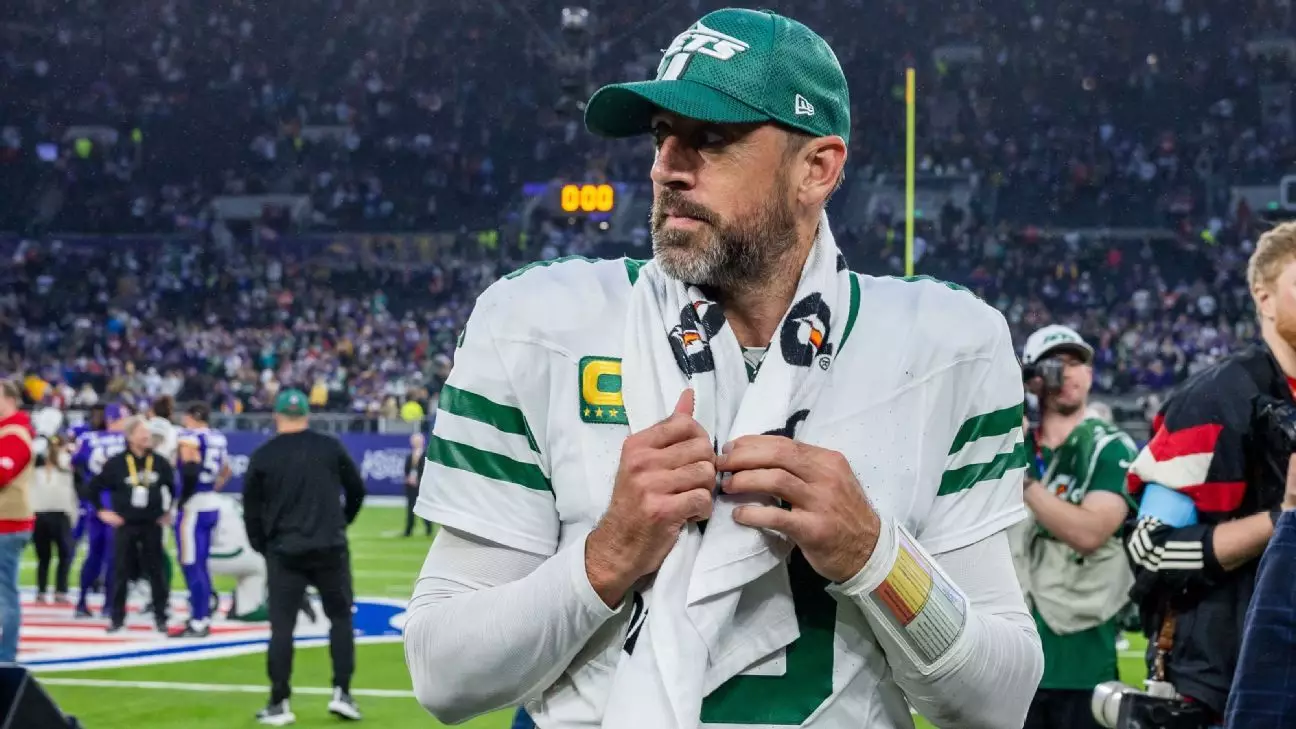The New York Jets became a point of intensifying scrutiny when they decided to relieve head coach Robert Saleh of his duties after only five games into the season. The abrupt decision sent ripples throughout the organization, particularly given the timing. As keen observers and fans began to speculate about the reasons behind Saleh’s dismissal, one name kept surfacing: Aaron Rodgers. During an appearance on „The Pat McAfee Show,“ Rodgers vehemently rejected allegations that he influenced owner Woody Johnson’s decision to let go of Saleh. Instead, he expressed his sadness over the situation, asserting, „I resent any of those accusations because they are patently false.“ This comment offers a glimpse into the complexity of relationships within a high-stakes environment like professional football.
Rodgers‘ insistence on defending his stance points to the sometimes blurry boundaries of power dynamics within organizations. In the cutthroat world of the NFL, it’s natural for players, especially high-profile ones like Rodgers, to be at the center of such conversations. However, the narrative that he may have played a role in the firing of Saleh paints an exaggerated image of his influence. „It’s interesting the amount of power that people think I have, which I don’t,“ Rodgers lamented, underscoring the dissonance between perception and reality in the sports world.
Despite the tensions, Rodgers also showed steadfast support for interim coach Jeff Ulbrich and for the changes that may come to the offensive staff. The potential to demote Nathaniel Hackett, a close friend of Rodgers and the now-former offensive coordinator, indicates the delicate balance between personal relationships and professional decisions. While change can often lead to significant shifts in team dynamics, players and coaches must navigate these transitions thoughtfully.
The players’ immediate reaction to Saleh’s dismissal was one of shock. According to tight end Tyler Conklin, there was no discussion during the players’ meeting about Rodgers influencing the decision. His comments reveal a prevailing sentiment within the team that reflects a collective responsibility for the Jets’ performance so far this season. Conklin stated, “I don’t think anybody inside this building player-wise or anything thought that he had anything to do with that.” This signifies a team unity amid a crisis, as players recognize their roles in the team’s ongoing struggles and acknowledge the necessity of improvement.
Despite the upheaval, it is worth noting that this move reflects a commitment to accountability and performance standards within the organization. Players such as linebacker C.J. Mosley expressed their surprise, capturing the unexpected nature of the announcement. At the heart of these reactions lies the recognition that, at the end of the day, football remains a results-oriented business. The burden of poor performance often falls on the head coach, regardless of the myriad factors contributing to the team’s issues.
Aaron Rodgers’ relationship with Saleh was already under scrutiny well before the latter’s dismissal. Their dynamic became focal due to an incident when Saleh fined Rodgers for missing a mandatory minicamp in favor of a vacation abroad. However, both men continuously maintained that their relationship was solid, with Rodgers referring to it as „a very solid relationship“ despite outside speculation. This situation encapsulates the manner in which personal relationships can complicate professional affiliations, especially under high-pressure conditions.
Rodgers’ reflections on the situation also gave insight into the internal conversations following Saleh’s firing. He expressed empathy for Saleh and his family, hinting that perhaps a different outcome on the field could have changed the trajectory that led to Saleh’s exit. “I got rolled up on in the game; my ankle got pretty banged up,” he noted, indicating his commitment to improving his performance for the team’s success.
As the Jets prepare to face the Buffalo Bills, the focus turns to the upcoming game and its implications for the season. The team, facing a two-game losing streak with a 2-3 record, has an opportunity for redemption and a chance to vie for the top spot in the AFC East. This pivotal moment can either mark a rallying point for the players and staff, potentially revitalizing their season, or lead to further entrenchment in their difficulties.
The fallout from Saleh’s dismissal serves as a reminder of the inherent pressures within professional sports environments. The reactions from Rodgers and his teammates demonstrate a blend of shock, empathy, and commitment to improving both personally and collectively. As the Jets navigate this uncertain terrain, the broader implications for team dynamics, accountability, and the quest for performance in high-stakes situations remain paramount.


Napsat komentář